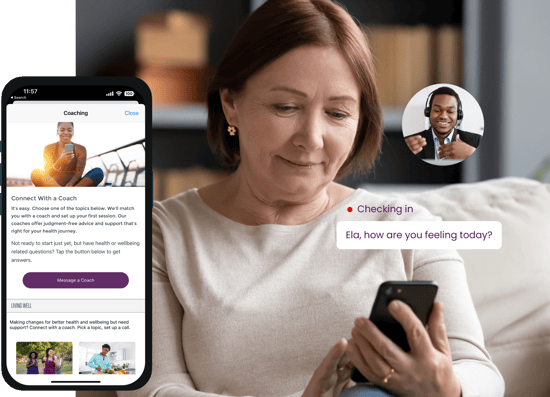Share this
4 Ways to Approach Nutrition Holistically and Inclusively
by Virgin Pulse on March 1, 2021
 Holistic and Inclusive Approaches to Nutrition for Health, Healing and Wellbeing
Holistic and Inclusive Approaches to Nutrition for Health, Healing and Wellbeing
At Virgin Pulse, we understand nutrition can be a complex and nuanced topic. The psychological, social and cultural contexts influencing food choices are multifaceted and well documented. That’s why we want to help members build nutrition habits and patterns that are flexible, accessible and individualized. We also recognize that human beings and life are complex and nuanced as well, and what works for one person may not work for the next.
Similarly, the updated 2020 Dietary Guidelines and National Institute of Health Nutrition Research Strategic Goals focus on helping people follow whole dietary patterns over time, at every life stage, with an individualized approach. These approaches are based on scientific evidence that appreciates the profound differences between individuals in dietary responses along with links between diet and disease risk: this includes healthy individuals, those at risk for diet-related diseases, and those already diagnosed with the disease.
"The Dietary Guidelines are meant to be adaptable to personal preferences, cultural foodways, and budgetary considerations. The Dietary Guidelines framework purposely provides recommendations by food groups and subgroups—not specific foods and beverages—to avoid being prescriptive. This framework approach ensures that people can ‘make it their own’ by selecting foods, beverages, meals, and snacks specific to their needs and preferences.”
This is exactly why the whole-person approach that Virgin Pulse's Coaches and Guides espouse is so important and so effective. It translates and applies to everyone—across generations, cultures, and geographies.
Applied to nutrition, it also enables us to honor that food is way more than fuel. It’s steeped in cultural and familial traditions and woven into the fabric of our everyday lives and broader society. As such, celebrating traditional foods and cooking methods can be a joyful and grounding experience that is uniquely satisfying. In our diverse society, we understand the significant role food plays in a person's cultural identity and therefore believe it unnecessary to sacrifice culture to achieve good health. When balanced and optimized to a unique individual’s lifestyle and health needs, a healthy relationship with food also has the power to heal. “Let food be thy medicine, and medicine be thy food,” to quote the wisdom of Hippocrates.
In the U.S., March is National Nutrition Month.
Wherever your employees are in the world, join us in celebrating one thing that unites us all: food! Here are four ways that Virgin Pulse Coaches and Guides support members using holistic and inclusive approaches to nutrition.
Honoring Individual Differences with a Person-First Approach
Coaches and Guides normalize individualized health values and encourage members to explore what healthful eating means to them. “What eating habits help you feel your best?” Diverse interpretations, bodies and lived experiences are respected and valued to come up with individualized goals and eating patterns that meet the person where they are.

Reconnecting with the Body’s Innate Wisdom
We empower participants to cultivate self-awareness and re-learn how to trust the wisdom of the body’s internal hunger and satiety cues—stomach sensations, ability to focus, energy levels, irritability, etc. This means slowing down and paying attention to the physical signs of both and how those cues change in response to eating consistently throughout the day in a balanced way.
This also involves recognizing how nutritious food and balanced meals affect not just energy and satisfaction but mood, digestion, sleep, and more. This involves tuning in to the physical response to certain combinations or amounts of different types of food that is sugary, salty, fatty, acidic, fresh, processed, etc. It also involves noticing how the presence or absence of satisfaction after a meal can impact current and future food choices and eating habits.
3. Promoting Quality and Balance
Coaches and Guides promote and support members with incorporating quality, nutrient-rich foods as much as possible according to where the individual is on their journey to healthful eating. This often means guiding participants in recognizing the specific benefits of carbohydrates, fat and protein, which is key to balanced eating for stabilizing the blood sugar response, in turn stabilizing energy and mood. A balance of carbohydrates, fat and protein in foods and meals also helps to prevent the extremes of “hangry” and uncomfortably full that can sometimes result from overdoing it on any one macronutrient, like carbs for example, while not getting enough of the other two, protein and fat for example.
We also empower members in enjoying a wide variety of foods to provide different vitamins and minerals, which in turn supports a greater diversity of healthy bacteria in the gut and also helps to prevent boredom from the same-old, same-old. Variety can also mean accepting and celebrating pleasurable and satisfying foods without guilt. Letting go of overly restrictive food rules and embracing the joy of eating can allow for greater satisfaction and connection to internal satiety cues that promotes an overall balanced and sustainable eating pattern – without the on-again, off-again rollercoaster of dieting.
4. Connecting the Dots for Sustainable Habits
Perhaps more than any other concept we support members with, Coaches and Guides recognize that optimal wellbeing is a symphony of healthful behaviors in nutrition, physical activity, sleep, and stress management that positively influence each other when in harmony. Why? Because the intersection of emotional, mental and physical health cannot be overstated.
Case in point: making and sustaining dietary changes is often difficult due to the influence and interactions of numerous factors spanning biological, psychosocial, sociocultural, and environmental domains that create and shape an individual’s “food environment.” Thus, to be effective, nutrition interventions must target multiple levels of the food environment. That’s why success with one’s nutrition goals may start somewhere unexpected—like addressing sleep issues or coping with stress to find the energy to devote to more nutritious food choices. It’s also why our whole person approach and support from a VP Live Coach or Guide can make all the difference. We empower members to create a personalized plan which will fit their unique lifestyle, budget, preferences, cultural norms, time constraints, religious beliefs, etc.
Learn more about Virgin Pulse's Live Services
Virgin Pulse's Coaching Services feature a whole-person approach that blends lifestyle optimization with specialization in an industry-leading 22 conditions, providing total population health management that helps the healthy stay healthy, improves clinical outcomes, and reduces costs associated with chronic conditions. Members access coaching resources directly through their app and once paired with a coach, they identify their goals for a thriving life and work together to progress toward their vision and achieve their targeted outcomes. To learn more about VP Live, reach out to your Client Success team.
Additionally, Next-Steps Consult helps members get the most out of their wellbeing program. It is a concierge-style conversation between a member and Health Guide, focused on determining a member’s first or next step in their wellbeing journey and personalized guidance of all that Virgin Pulse and employer benefits have to offer. Our Health Guides uncover the best route for members based on their health status, motivators, and obstacles, with deep knowledge of client programs and resources.
Share this
- Employer (54)
- Program Tips (46)
- Wellbeing (40)
- International (29)
- Health Systems (23)
- Health Plans (18)
- Staying Healthy & Safe (15)
- VP Activate (15)
- Production Campaigns (12)
- Health (11)
- Webinars (11)
- Thrive Summit (10)
- Success Stories (7)
- Toolkits & Guides (4)
- Embracing Diversity (3)
- Mental health (1)
- May 2024 (1)
- April 2024 (1)
- March 2024 (2)
- February 2024 (1)
- January 2024 (5)
- December 2023 (2)
- November 2023 (1)
- October 2023 (2)
- September 2023 (4)
- August 2023 (5)
- July 2023 (4)
- June 2023 (2)
- May 2023 (1)
- April 2023 (4)
- March 2023 (1)
- February 2023 (1)
- January 2023 (1)
- December 2022 (2)
- November 2022 (7)
- October 2022 (6)
- September 2022 (2)
- August 2022 (4)
- June 2022 (2)
- May 2022 (5)
- March 2022 (1)
- January 2022 (1)
- December 2021 (1)
- November 2021 (1)
- October 2021 (2)
- September 2021 (2)
- August 2021 (1)
- July 2021 (1)
- June 2021 (3)
- April 2021 (6)
- March 2021 (1)
- February 2021 (3)
- January 2021 (3)
- December 2020 (2)
- November 2020 (2)
- October 2020 (2)
- September 2020 (3)